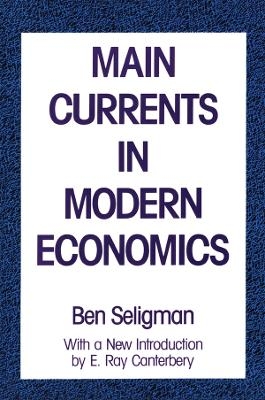
Main Currents in Modern Economics
Transaction Publishers (Verlag)
978-0-88738-811-8 (ISBN)
Seligman also shows us how the doctrines begin to repeat themselves. Jevons, the Austrians, and J.B. Clark reaffirm tradition with the rediscovery of marginalism. A more neutral version of "equilibrium economics" is supplied by Luon Walras and Vilfredo Pareto, a main current of thought extended by John R. Hicks and Paul A. Samuelson. Seligman characterizes the principle trait of modern doctrine as the use of technique for its own sake. Dismissing G.L.S. Shackle's writing on uncertainty, he criticizes Shackle's use of continuous rather than discontinuous function.
Main Currentsmay have been published too soon to be fully appreciated. Seligman's focus on the thrust toward technique now has a ring of truth that can no longer be ignored. As Ray Canterbury notes in his introduction, in some respects only the names of the players have changed, andMain Current'spertinence to today's issues is self-evident. Economics has moved so deeply into technique that the next generation may have to rediscover the past in order to find its way out. Seligman's book is a good place to begin the journey.
Ben Seligman (1912—1970), an activist in economic affairs and a scholarly dissenter from conventional economics, wrote or edited eight books as well as numerous articles in the popular press., E. Ray Canterbery, professor of economics at Florida State University, is the author of five books or monographs and many articles in scholarly journals as well as more general media such as The New York Times Magazine. He was president of the Eastern Economics Association in 1986-87.
Part One The Revolt Against Formalism, Foreword, Introduction to the Transaction Edition, 1 Protest from the Historicists, i “Geisteswissenschaft und Verstehen”: The Awareness of Man, ii Gustav von Schmoller and His “Grundriss”, iii Werner Sombart: History as Economics, iv Max Weber and the Capitalist Spirit, v Brentano, Bucher, Wagner, and Knapp, vi Arthur Spiethoff: Economics as Style, vii Simiand, Toynbee, Cunningham, and Ashley, viii R. H. Tawney: Ethics in Economics, 2 The Socialist Attack, i Marxian Economics Revisited, ii Early Critiques of Marxism: The Transformation Problem, iii The Rise of German Revisionism, iv The Fabians and Guild Socialists, v Analyses of Capitalist Maturity: Hilferding, Luxemburg, and Bauer, vi Some Russians: Tugan-Baranovsky and Investment; Lenin and Imperialism, vii Socialism without Marx, viii Contemporary Neo-Marxists, ix The Soviets Discover Calculation, 3 Institutionalism and the Dissenting Spirit, i The World of Thorstein Veblen, ii John R. Commons: Transactions and Going Concerns, iii Wesley C. Mitchell: Empiricism without Theory, iv John Maurice Clark: Social Control in Moderation, v John A. Hobson: A British Institutionalist, vi Ayres, Hoxie, Selig Perlman, and Gardiner Means, vii Countervailing Power and Affluence: J. K. Galbraith, Part Two The Reaffirmation of Tradition, 4 From Marginalism to Libertarianism, i W. S. Jevons: The Discovery of Marginalism, ii Menger, von Wieser and the Origins of Austrian Doctrine, iii Eugen von Bohm-Bawerk: The Bourgeois Marx, iv John Bates Clark: American Marginalist, v Ludwig von Mises: Libertarianism “in Extremis”, vi Friedrich von Hayek: The Austrian Tradition Refined, vii The Marginalist Debate Today, 5 Equilibrium Economics and the Unification of Theory, i Leon Walras: The Greatest Economist?, ii Vilfredo Pareto: Science as Sermon, iii John R. Hicks and the Logic of the Consumer, iv Paul A. Samuelson: Neo-Classical Synthesis, v Wassily Leontief and Input-Output Analysis, 6 Streams of Tradition in Britain, i Sidgwick, Wicksteed, and Edgeworth, ii Alfred Marshall: The Tradition Established, iii A. C. Pigou and Welfare Economics, iv Sir Dennis Robertson: Money and Industrial Fluctuation, v Sir Ralph Hawtrey: Economics of Traders, vi Lord Robbins: The Logic of Choice, vii G. L. S. Shackle: Expectations, Time, and Decisions, Part Three The Thrust Toward Technique, 7 The Swedish Contribution, i The Economics of Knut Wicksell, ii Gustav Cassel: Economics as Pure Price, iii David Davidson: Swedish Ricardian, iv Bertil Ohlin: Trade and Factor Prices, v Erik Lindahl: Money and Capital, vi Erik Lundberg: Sequence Analysis, vii Gunnar Myrdal: Values in Theory, 8 The American Dichotomy, i The Young Radicals: Ely, Patten, Seligman, Carver, ii Frank W. Taussig: American Traditionalist, iii Pecuniary Economics: Fetter and Davenport, iv Irving Fisher: Capital, Interest, and Income, v Frank H. Knight and Abstractionism, vi Alvin H. Hansen and the Mature Economy, vii Milton Friedman: Theory as Ideology, viii Kenneth E. Boulding: The Economics of Organization, 9 From Realism to Technique, / Joseph A. Schumpeter and His Innovator, ii Sraffa and the Collapse of Competitive Theory, Hi A World of Monopolies: Joan Robinson and E. H. Chamberlin; Stackelberg and Triffin, iv The New Economics of John Maynard Keynes, v Neo-Keynesianism: Some Theories of Growth, vi The Ultimate in Technique: Game Theory and Linear Programming, Concluding Remarks, Notes, INDEX
| Erscheint lt. Verlag | 28.2.1990 |
|---|---|
| Verlagsort | Somerset |
| Sprache | englisch |
| Maße | 152 x 229 mm |
| Gewicht | 1156 g |
| Themenwelt | Geisteswissenschaften |
| Sozialwissenschaften | |
| Wirtschaft ► Allgemeines / Lexika | |
| Wirtschaft ► Volkswirtschaftslehre | |
| ISBN-10 | 0-88738-811-6 / 0887388116 |
| ISBN-13 | 978-0-88738-811-8 / 9780887388118 |
| Zustand | Neuware |
| Informationen gemäß Produktsicherheitsverordnung (GPSR) | |
| Haben Sie eine Frage zum Produkt? |
aus dem Bereich


